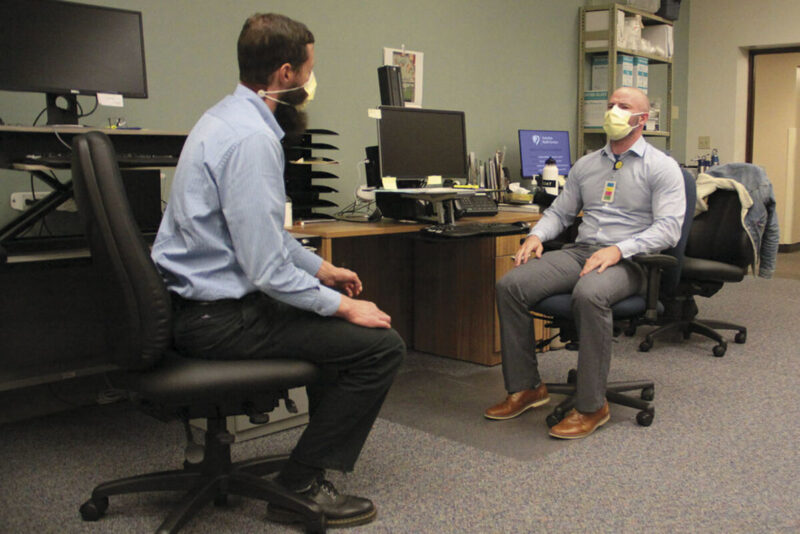Benny Westcott
In 2018, Mid Valley Healthcare received a Human Resources and Services Administration grant from the federal government.
The grant, overseen by the Coast to the Cascades Community Wellness Network (CCCWN), financed a support system in which a project director, a project coordinator, and peer support workers working out of Sweet Home Family Medicine offer services to aid in reducing substance overuse and addiction.
The grant money, which is intended for Sweet Home, Brownsville and the surrounding areas, initially came in response to a string of fatal overdoses and a lack of resources and support for people who need help with battling drug addiction in eastern Linn County, said James Page, a project coordinator on the grant, who started working in Sweet Home in April of 2019.
“The opioids hit really hard at one point,” he said.
Grant Funds Residential Treatment
Through the grant, Page and other staff have helped Sweet Home residents get into the Samaritan Treatment and Recover Services (STARS) facility in Lebanon, by taking care of logistics and even arranging transportation if need be.
Once a person is out of residential treatment and returns home to Sweet Home, they are still provided with peer support and outpatient services, and the team at Sweet Home Family Medicine can help place them into 12 Step meetings or other support organizations to continue to assist their recovery.
According to Page, the work Samaritan does goes the extra mile to make a connection with people struggling with addiction, and helps them take positive steps forward.
“The alternative to all of this is someone comes in, you give them a bunch of phone numbers to treatment centers and say, ‘Hey, call these places, get on their waiting list, do all this stuff, and then let me know if you need help after that,'” Page said.
“Then people leave with a list full of phone numbers and really no direction on how to get there and what to really do in order to get there, and then they wind up not being able to really follow through.”
Grant Funding Leads to ‘Success’
And while there’s always room for improvement, Page says the methods put into operation by the grant’s funding have worked.
“We have been very successful. And we’ve had a lot of really amazing success stories, for people that I don’t know how their story would have went had we not been in the position that we were in to help them,” he said. “As a result of having the resources out here that we do, we’ve been able to facilitate and maybe expedite the process for a lot of folks to get clean, stay clean and find a new way to live.”
‘Hub-and-Spoke Model’
The work done to help people struggling with addiction in east Linn County operates under what Page calls a “hub and spoke model.” The hub is in Lebanon, which houses the residential treatment facility, outpatient offices, and a medication assisted treatment clinic.
Sweet Home Family Medicine is one of the spokes.
The purpose of the hub-and-spoke model, according to Page, is to get people who are struggling with addiction to the hub in order to stabilize them. Then they can be referred out to a spoke for continued medication assistance and support.
“The hub-and-spoke model is very efficient in that if someone is receiving services up in Lebanon, and they’ve been stabilized, then they can get re-referred back down here. So they get to receive services in their own community, which is a lot easier for most folks than commuting up to Lebanon once or multiple times a week. That can create a significant barrier, because of the transportation challenges here,” he said.
Peer Support Critical
Peer support workers funded by the grant will even go so far as going to the house of people seeking help.
At these in-house meetings, peer supports will identify recovery goals with people, and answer questions such as “What do you want to do?” “How do you want to do it?” and “What are the challenges you face in accomplishing those goals?.” Peer supports will then continue to support the recovering person while the person is at residential treatment facilities, perhaps by having lunch with them once a week.
These “peer supporters” are not counselors and are not closely associated with treatment providers, said Joshua Pankau, a peer supporter himself. They are simply people with real-life experience.
Pankau said, “What I usually try to do is to create some form of therapeutic bond so they feel as though they can tell me things. I just am someone that comes alongside you as positive support, which sometimes is all someone really needs to start moving forward.”
The services provided by Page and other Samaritan staff come at no cost to the people using them. They are funded 100% by the HRSA grant. Along with there being no monetary obligation, Page says there is also no obligation as far as what people can do with the services.
“If people are interested in education about addiction, recovery, or just a general conversation about a family member or coworker going through something, that’s what we’re here for. We’re here to support people every step of the way and in every dimension that the problem exists,” he said.
Page says he usually starts his day by checking hospital emergency department discharge reports. He looks for people that have been discharged from the emergency room in Lebanon due to substance use disorder issues. He then does outreach to those individuals by calling them and asking them if they are interested in services. If they are interested, Page usually contacts a peer support to do a follow up with them.
Page says he is also constantly working with individuals who come into the clinic in need of support. As a certified drug and alcohol counselor, he can make a full assessment, refer them to a treatment center, help them get their appointment scheduled, and even help transport them to the appointment, if needed.
But Page isn’t the only one at Samaritan who is on a mission to help people who are suffering due to substance use.
“None of the services we are providing and continue to advance would be possible without the leadership, support and tireless effort of CEO of Samaritan Lebanon Community Hospital Marty Cahill, Director of Community Health Promotion of Samaritan JoAnn Miller, and Dr. Bruce Matthews of Samaritan,” Page said.
“These are just three of the many hard working and passionate individuals within Samaritan and the Coast to Cascade Community Wellness Network who work to improve the lives of the individuals who comprise our communities.”
Narcan Key in Sweet Home
Another big component of the grant operated out of Sweet Home Family Medicine is Narcan distribution. Narcan, a form of naloxone, is a medicine that can treat narcotic overdose in an emergency situation.
“Our mission is for everyone in our community to have a Narcan kit in their first aid kit, the same way they would BandAids or gauze or anything else,” said Page.
The Sweet Home Family Medicine location also distributes naloxone for free to the community.
“If people are interested in it or want it, then we supply it,” Page said.
Page also does naloxone trainings, showing people how to administer it and what a kit looks like.
Challenges In Sweet Home
While Page considers the HRSA grant to have been a success so far, he also noted some of the challenges he and other workers have faced and will continue to grapple with in their efforts to help people with addiction related issues in Sweet Home.
According to Page, a lot of the challenges stem from Sweet Home being a rural community.
“The biggest challenge with any rural area is the isolated nature. The individuals in the community seem more isolated to me.
“There’s less opportunity to have conversations with folks, offer them services, and do the type of work that we’re out here to do.
“It’s really challenging to find all the people that we want to find,” Page added.
He also noted the lack of social services in rural areas like Sweet Home.
“There’s not a lot of agencies that people can turn to for help when they want it,” he said. “The primary care clinic is great, Linn County is great, and Exodus and SHEM. These providers are all doing a tremendous job. But there’s just a lack of overall support for people out here, so that makes it challenging.”
COVID Complications
The COVID pandemic has also made the work more difficult for staff. Page said the pandemic has at times made it more difficult to get staff out to the Sweet Home location.
And Pankau spoke on how the pandemic has made it more difficult to forge a connection with people who need help. “It’s created kind of an impersonal-ness,” he said.
“I can meet at houses, but I can’t go into houses. A lot of people with addiction issues sometimes suffer from trust issues, so when they can only see half of your face, they’re kind of like ‘who are you really, behind the mask?’
“Sometimes even without a mask, they’re already trying to figure that stuff out.”
Page also said that COVID has had an effect on the state of addiction issues among Sweet Home residents themselves. And the effect has not been positive.
“I would say that it’s intensified the problem,” he said of COVID. “People’s willingness or motivation to seek help has been diminished. It’s already a really challenging situation for individuals to get out and ask for help. I think for humans in general, even if we’re not talking about substance abuse disorders, people tend to struggle to ask for help. But with the additional layer of COVID, it’s just made everything that much more challenging.”
He added, “It’s kind of exacerbated the symptoms already pretty consistent with addiction. A lot of people say that substance use disorders are a disease of isolation. So when you add a social situation that forces more isolation on you, I think it just puts people that much further away from the solution, which is asking for help and getting out of the position that they’re in.”
Page said that at one point in the pandemic, there was a big diminishment in people seeking help in general. “You can see that with diabetic care and any kind of chronic health issue,” he said.
Recently, things have turned around a bit on this front.
“Now, I think that people are reaching out more, but when they’re reaching out their condition is much worse than what we would see typically,” said Page.
Substance Abuse Stigma
Page stated that there is a lot of damaging stigma surrounding addiction and drug overuse, in Sweet Home and beyond.
“Historically, with mental health conditions and addiction and the whole gamut of things that people struggle with, there’s this idea that we should just say no, or that you should pick yourself up by your bootstraps and figure it out,” Page said. “And all of that is kind of generated around this idea that people are making a conscious choice.
“And I think it’s fair to say that at some point, we all made a conscious choice to pick up that first drink or do whatever it is that people do. The problem is, what happens to an individual with a substance use disorder is that the reaction they have to that first drink or drug is drastically different than the reaction that someone who doesn’t develop a substance use disorder would have.”
“What we’re dealing with is not a moral issue, or an education issue, or a socioeconomic issue,” he said. “It’s something different. It’s the brain’s response when you ingest the substance.”
“I’ve worked with thousands of individuals with substance abuse disorders at this point in my career, and I don’t know one person who was ever growing up and said ‘I want to be a drug addict when I grow up, or ‘I want to be an alcoholic,'” Page said.
“The reality is that there is a percentage of the population that has a different reaction to substances than the majority of the population, and those people are not just simply deciding that they want to be homeless, that they want to abandon their kids, that they want to die from an overdose, that they want to go to the depths of despair that addiction brings about to someone’s life. It’s not logical. So when it comes to addiction, what we’re talking about is a brain disease.”
First-Hand Knowledge
Page has done a lot of research on addiction. But he has also learned many lessons from first-hand experience.
Page himself is a recovering addict who got clean and sober in 2007. His parents were both addicted to substances during his childhood, during which he experienced a lot of homelessness, and went through “all of the chaos that comes along with living with two people who are dependent on substances.”
After living through these experiences, Page said “I was the last person who ever wanted to be someone who was dependent on substances. I watched substances destroy my parents’ life right in front of me. I watched it create an environment where we were sleeping in the backyard of some random person’s house in a tent, in the rain, in the middle of winter. I despised drugs as much as you could growing up, but because I have this thing, whatever it is, my reaction once I took that first drink set me on the course to be in that same exact position that I was in as a kid, but this time I was the perpetrator instead of the victim.”
When Page was finally able to overcome his addiction and get sober, he was working at a mill pulling dry chain.
“It was real hard work. Real monotonous,” he said.
He did that for a couple more years after getting clean, but then got unsatisfied with the work and the paycheck, he said.
So he took a year off. The time off gave him an opportunity to read his first book and do some things to enrich himself. He said he didn’t have much of an opportunity to do those things prior to that year because his life was so chaotic.
“I kind of went from the chaotic mess that my parents had created to the chaotic mess that I created,” he said.
At the tail end of his year off, he got an internship to become a certified alcohol and drug counselor at Serenity Lane in Coburg. He went through a year-long internship program there.
“It was one of the best experiences that I’ve had in my life,” he said of the program.
According to Page, Lloyd Walker, who ran the internship program, was “a brilliant, Ph.D-level guy who was very philosophical.”
“He was someone that really sparked a passion in me for psychology, counseling, people, and philosophy,” Page said of Walker.
“It opened up a door that hadn’t previously been open,” he said of the internship.
After that experience, he got into counseling, a profession he has undertook for nearly a decade now. He brings his life and work experience into his current role at Sweet Home Family Medicine.
‘No Discrimination’
Page has worked with people of all ages and demographics in his career.
“There’s no discrimination with addiction,” he said. “I’ve worked with doctors who have substance use disorders, and I’ve worked with people who’ve spent the last 30 years of their life in prison who have substance use disorders.”
The HRSA grant serving east Linn County is scheduled to end on Sept. 30 of this year. But it may extend longer, Page said.
“Due to COVID and these other challenges, we’re optimistic that we might see an extension for six months or a year, depending on how things go,” he said.
People looking for help or support in dealing with substance use issues can reach out to Page or peer supports via phone or email.
There is also an upcoming class facilitated by the director of STARS and another grant project coordinator where community members can learn more about substance use disorder in a virtual seminar on Tuesday, April 27, from 11:15 a.m. to noon. Registration is required and can be completed at samhealth.org/BeHealthy.
While he continues to work in Sweet Home as a project coordinator for the HRSA grant, Page has a simple mission.
“My goal is just to help as many people as we can while we have the funding to do so.”




